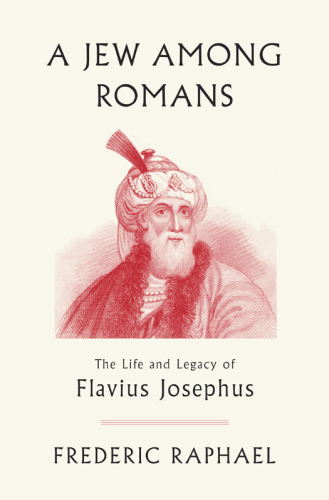
A Jew Among Romans
The Life and Legacy of Flavius Josephus
- اطلاعات
- نقد و بررسی
- دیدگاه کاربران
نقد و بررسی

September 3, 2012
Alternately hailed as the grand chronicler of the Jewish war with the Romans and reviled as a traitorous propagandist for the Roman emperor, the Jewish historian Josephus (37–c. 100 C.E.) captured compellingly in his two major works—The Jewish War and Jewish Antiquities—both the glory and despair of first-century Judaism. With the verve of a good storyteller, novelist and biographer Raphael (Somerset Maugham and His World) recreates Josephus’ life and chaotic times: rapid changes in imperial leadership, with corresponding changes in Rome’s treatment of the Jews in Judea. After a period of travel in Rome, Josephus became the provincial governor in Galilee. According to his own account in The Jewish War, he tried to mediate a truce with the Romans as they marched into Jerusalem to destroy it, but landing in the Masada fortress, he suggested that all Jews there commit suicide rather than die at the Romans’ hands. Fortuitously, he drew a lot that allowed him to escape this fate only to be handed over to the emperor Vespasian, whom Josephus cannily convinced of his value as a court historian. Raphael’s page-turning chronicle paints a portrait of Josephus as the first Jew to relate non-Judeocentric world history, yet a man whose Jewish identity remained central to his life even as he assimilated as a means of survival. Agent: Steve Wasserman, Kneerim and Williams.

November 1, 2012
Novelist, screenwriter and biographer Raphael (Ifs and Buts, 2011, etc.) succeeds admirably in recovering the reputation of much-maligned historian Titus Flavius Josephus (37-100). Born to a prominent Jerusalem family, and deeply opposed to a ruinous war with imperial Rome, Josephus provided the sole existing account--The Jewish War--of the Great Revolt of Judaea against the empire. It is a unique chronicle, Raphael insists, in that no previous losing general in a war ever crossed the lines to describe the defeat of his own side. Retained by the Flavian emperors, first as seer and negotiator, and accorded a Romanized name (he was born Joseph ben Mattathias), Josephus would be accused of treachery against the cause he once served, reviled as a Judas by contemporaries and modern detractors alike. Raphael is inclined to support Josephus' veracity, albeit with pointed disclaimers. He argues that to dismiss this adroit survivor as a traitorous collaborator underrates not only Josephus' desire to save Jewish lives, but also his subtlety as a secular historian who smuggled brutal truths about Roman conduct into his work. As Raphael is chiefly concerned with Josephus' character and writing, his extensive references are almost entirely literary and biographical, many dealing with Jewish writers and intellectuals (Spinoza et al.) through the centuries who echo Josephus' life as an apostate and alienated observer. Informed by scrupulous, sometimes exhaustive footnotes and addenda, the book is not simply an arresting biography, but a persuasive history of an era. Like his subject, Raphael's breadth of intelligence works against single-mindedness. Throughout, he quotes the conclusions, often opposed to his reading, of other historians. Raphael is imposingly erudite and at pains to demonstrate it, yet there is a remarkable clarity to the writing, many elegant turns of phrase and a measure of sly humor.
COPYRIGHT(2012) Kirkus Reviews, ALL RIGHTS RESERVED.

October 15, 2012
Titus Flavius Josephus (born Joseph ben Mattathias), the first-century Roman Jewish historian, remains a compelling subject for an exploration of what it means to be an assimilated Jew, a common subject for Raphael. Best known for his novels and screenplays, Raphael has occasionally written biographies of figures who illustrate his interests, such as Alexander the Great (Some Talk of Alexander). Josephus's life and works form the strands that Raphael grasps as he meanders through much of the Jewish experience in the Roman Empire and post-Roman world, pausing throughout to reflect on the infighting among members of a minority as they existed within a larger culture. Another figure ostracized by the Jewish community, Spinoza, appears frequently here as well. Raphael's coverage of the topic is weakened by distracting changes of subject within chapters and chatty footnotes. VERDICT Fans of Raphael's writing generally will enjoy this, but lay readers seeking to learn about Josephus may be better served by Desmond Seward's Jerusalem's Traitor: Josephus, Masada, and the Fall of Judea.--Margaret Heller, Dominican Univ. Lib., River Forest, IL
Copyright 2012 Library Journal, LLC Used with permission.

November 15, 2012
Yigadel Yadin, the Israeli general and renowned archaeologist, referred to Josephus as a great historian and a bad Jew. Undoubtedly, many of the Jewish contemporaries of Josephus would have agreed with the latter assertion. Fortunately, Raphael, a novelist and classicist, provides a more nuanced portrayal of the first-century-CE soldier, politician, and historian. When the cataclysmic Jewish War began in 66, Josephus, a governor of Galilee, tried to mediate between his fellow Jews and their Roman overlords. When that effort failed, Josephus joined the rebellion. Apparently sensing the futility of the revolt, he switched sides, became a translator for the Roman general Vespasian, and later became a friend and court favorite of the Emperor Titus. Yet, as Raphael demonstrates, it would be unfair and wrong to see Josephus as simply an opportunistic turncoat and Roman lackey. In his later writings, he proudly defended the culture of the Jews. Like countless other Jews from antiquity to the present, Josephus tried to navigate between commitment to Judaism and the broader, often hostile gentile world. This is a well-done account of his life and works.(Reprinted with permission of Booklist, copyright 2012, American Library Association.)




دیدگاه کاربران